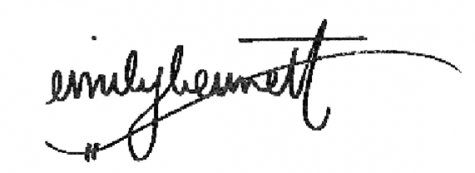What’s in a name? A farewell letter from the editor
December 4, 2018
My name is Emily. You probably know 73 Emilys. We’re everywhere.
There’s at least three of us at any given time waiting for our coffee at Starbuck’s. You definitely have at least three of us in the each of your classes. When I started school here, there were two people with the name Emily Bennett enrolled. There are so many of us that I’m not even permitted to be bitter about any of my ex-boyfriends going on to date other Emilys. It’s become blasé. I almost wait for it now.
This may be a confusing time to be alive on this big blue marble, but if there’s one thing I’m unwaveringly sure of, it’s that the world is chock-full of white 20-somethings named Emily.
My parents, who both possess what I confidently believe to be higher than average IQs, named me Emily, and I’ll admit I’ve never forgiven them for it. Emily is an admittedly forgettable name, and as a kid, I felt the need to compensate for the forgetability of my moniker. (Now, not so much.) My birth year of 1997 saw the entrance and the excess of the Emilys, Jessicas, Ashleys and Sarahs of the world.
Names are important. You may not be responsible for naming yourself, but you could be in charge of naming your pets, your most valued inanimate objects and much more. Naming your circumstances and situations – giving things the importance of giving them a name – means that they hold value. When I was in high school and didn’t approve of my friends’ crushes, I would purposely get their names wrong. Jesse became Jesús and Danielle became Debbie. Names have some power, certainly.
Our names are not where we find our sole meaning, but they are usually what distinguish us from others. They could be a huge component of our identity – when someone asks the question, “Who are you?” we normally respond with our name. Call it habit or social construct, but a name serves as a serious tool for distinction. If you did something really awesome in life, like fly to the moon, you would want to be remembered by name, right?
Transcending across all languages, names abound. Though variations are vast, there is a widely systematic and cross-cultural constancy of practices related to name-giving. We give proper names to people, cities, monuments, landmarks, touches of nature, books, movies, non-human things that make us happy (favorite guitars, tomato plants we want to stay alive, small ladybugs we discover on the windowsill). When I was a kid, I used to name the raindrops that would race down the car window of our minivan.
My dad actively defends his decision to name me on the basis of an admiration for Emily Dickinson, who, in my perspective, is a semi-overrated poetess with some seriously repressed homoerotic longings.
When I grew up a little, I came to know that Dickinson wasn’t just “hope is the thing with feathers,” in a similar way that I discovered Bruce Springsteen wasn’t just “Born in the U.S.A.” She was abnormally gloomy and as morbid as an undertaker, but she somehow mastered how to turn words into bodies of hope, desire and aspiration. She was a bit of a rebel with her improper use of punctuation, too. (In that sense, she’s a bit of a guilty pleasure for me.)
She wrote this weird poem for her brother where she debatably compares herself to the garden of Eden and/or begs her brother to come back to Boston. I think it’s about home. Here’s a little snippet, for your reading pleasure.
“There is another sky,
Evere serene and fair,
And there is another
sunshine,
Though it be but
darkness there;
Never mind faded
forests, Austin,
Never mind silent
fields–
Here is a little forest,
Whose leaf is ever
green…”
There is another sky…
She’s telling her brother the story of their home. There is another sky means “come back, there is another place for you.” I think she’s saying she would give anything for her brother to come back.
Home is something special. I left my West Virginia home when I began college here three and a half years ago. I left a soft, green yard, a dog and a cat, a tiny town with a church around each bend. I swapped it for a semi-small city called Pittsburgh, and it slowly but surely advanced its way into a sect of home-ness in my heart.
Clutching a yellow notebook plastered with a shameful sticker (“Punk Rock is Good For You”), Emily Bennett – freshman edition, scooted nervously into a pitch meeting for The Globe. I didn’t know anybody. I didn’t really know how to write anything, save for short stories related to space and teenage longing. Admittedly, most of what I knew about journalism was Rory Gilmore-related. I took a pitch, and here I am.
What could home possibly mean for so many? Is it a collection of people, images, smells? Is it a place? Or places? For some, it may be a memory, just a wisp. For others, it is aunts and uncles and raucous conversation across a table covered in food.
For me, home turned into a place filled with people who had subscriptions to the New York Times daily crossword puzzle. Home was a chalkboard covered in quotes from delirious, late-night copyediting stretches. It smelled like hot coffee, looked like fonts and margins, and felt an awful lot like the real world.
The Globe gave me a place to be more than another Emily. It gave me a chance to challenge myself. It gave me opportunity. It gave me the chance to document a presidential election year up close. It gave me the gift of celebration when the 50 year mark came around for The Globe. It allowed me to brainstorm weekly with my brilliant, show-stopping peers. It has frustrated me, broken my heart, electrified me back to life, and circled back round again and again. If I lived a thousand lives, I could never say thank you enough.
Former graduating editors have used some space in their farewell letter to let everyone know where they’re headed post-grad. My plans are to clean out my car and finish a book I’ve been nursing for about a month. Sorry! (And thank you, thank you, thank you.)





















Judy Ponton • Dec 5, 2018 at 10:28 PM
I love you dearly Emily, you are so talented with words, emotions, your actions, determination, staying the line, being kind to so many, love and respecting of your parents, love for your brother and so many others. I wish with all of my heart there were Emily Bennett’s, trying to make the world a nicer, kinder, loving world. You have touched so many people in your young life that have made a difference in their direction of life!!! I am so Very, Very proud of you and all you have accomplished, God Bless you. Love Aunt Judy
Angela Abdoo • Dec 5, 2018 at 9:09 PM
CONGRATS!!
Well Done, Emily!!
May your path be filled with time to read, write, love, & enjoy being Emily!
God bless you!!!
Z